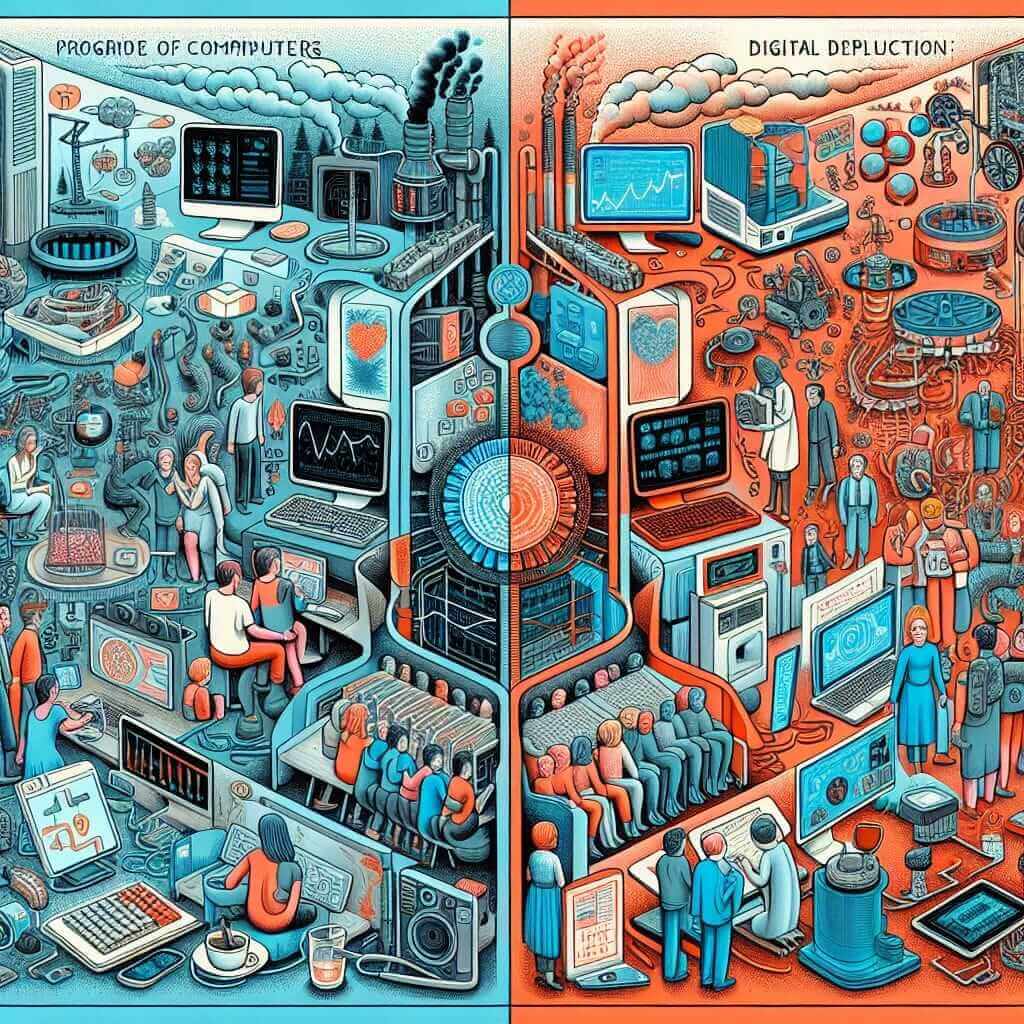As an IELTS instructor with over two decades of experience, I’ve encountered numerous essay and speaking prompts. One that frequently surfaces is the role of computers in society. This topic often arises in both the IELTS Writing and Speaking tests, reflecting the undeniable impact of technology on our world. Whether you’re preparing for an upcoming IELTS exam or simply aiming to enhance your English communication skills, this comprehensive guide will provide you with the tools to confidently discuss this topic.
Understanding the Question and its Relevance to IELTS
Before we dive into the specifics, let’s break down why this question appears in the IELTS exam. The IELTS Speaking test assesses your ability to articulate opinions, present well-structured arguments, and use a diverse range of vocabulary – all within a specific timeframe. The question “Do computers help society?” is designed to evaluate these skills. It requires you to:
- Analyze: Weigh the benefits and drawbacks of computers in a societal context.
- Articulate: Clearly express your viewpoint using appropriate vocabulary.
- Support: Substantiate your claims with relevant examples.
- Organize: Structure your response logically and coherently.
Constructing a Well-Rounded Response
To excel in this section, consider these strategies:
1. Acknowledge Both Sides
Begin by acknowledging that computers have both positive and negative impacts. This demonstrates a balanced perspective and critical thinking. You might say:
“It’s undeniable that computers have revolutionized our world, bringing about immense progress. However, it’s also crucial to acknowledge the potential downsides.”
2. Highlight the Benefits
Discuss the various ways computers benefit society. Use specific examples to illustrate your points. Here are some key areas to consider:
- Communication: Computers have transformed communication, making it faster and easier to connect with people globally. Email, social media, and video conferencing have revolutionized the way we interact.
- Education: Online learning platforms, research databases, and educational software have expanded access to knowledge and resources.
- Healthcare: Computers play a vital role in medical advancements, from complex surgeries aided by robotics to drug discovery and development.
- Efficiency and Productivity: Computers automate tasks, streamline processes, and improve efficiency across various industries, from manufacturing to finance.
For instance:
“Take the field of medicine. Computers enable minimally invasive surgeries, leading to faster recovery times and reduced risk of complications. Moreover, medical imaging techniques rely heavily on computers, allowing doctors to diagnose and treat illnesses with greater accuracy.”
3. Address the Drawbacks
While highlighting the positives, it’s equally important to acknowledge the potential negative impacts of computers. Here are some areas to discuss:
- Job Displacement: Automation and artificial intelligence, while increasing efficiency, can lead to job losses in certain sectors.
- Digital Divide: Unequal access to technology and the internet can exacerbate existing social and economic inequalities.
- Privacy Concerns: The increasing reliance on computers raises concerns about data security and the potential misuse of personal information.
- Social Isolation: Excessive screen time and the rise of social media can contribute to social isolation and mental health issues.
Example:
“However, we cannot disregard the potential downsides. The increasing automation driven by computers has led to concerns about job displacement in certain industries. It is essential to address these challenges and ensure that technological advancements benefit all members of society.”
4. Offer Balanced Conclusions
Conclude your response by summarizing your viewpoint. Reiterate that computers have both advantages and disadvantages. You can state:
“In conclusion, while computers offer incredible benefits that have revolutionized various aspects of our lives, it’s crucial to be mindful of the potential drawbacks. By addressing these challenges responsibly, we can harness the power of technology to create a more equitable and prosperous future.”

Illustrative Examples from IELTS Speaking Tests:
Let’s examine how these strategies can be applied to potential IELTS Speaking prompts:
Part 1: (More general and personal)
Examiner: “Do you use computers often?”
You: “Yes, I use computers daily. I rely on them for work, communication, and entertainment. They’re an indispensable part of my life.”
Examiner: “What do you think are the main benefits of computers?”
You: “For me, the greatest benefit is the ease of communication. I can instantly connect with friends and family overseas, thanks to video calls and messaging apps. Additionally, computers have made learning more accessible, with a wealth of information available at our fingertips.”
Part 3: (More abstract and detailed discussion)
Examiner: “Some people believe that computers are making us less intelligent. What’s your opinion?”
You: “That’s an interesting perspective. While it’s true that over-reliance on computers for simple tasks might hinder certain cognitive skills, I believe they have also expanded our intellectual horizons. For example, the internet provides access to vast libraries of knowledge and fosters global collaboration in research and academia.”
Essential Tips to Remember:
- Vocabulary is Key: Utilize a wide range of vocabulary related to technology and its impact.
- Connect with Examples: Always support your points with specific examples from your personal experiences or general knowledge.
- Stay Relevant: Ensure your responses directly address the examiner’s questions.
- Practice Makes Perfect: Regularly practicing speaking about technology-related topics will enhance your fluency and confidence.
By following these guidelines and practicing regularly, you’ll be well-equipped to confidently tackle any IELTS question related to the impact of computers on society. Remember, the key is to demonstrate your ability to present a balanced, well-structured, and vocabulary-rich response. Good luck!